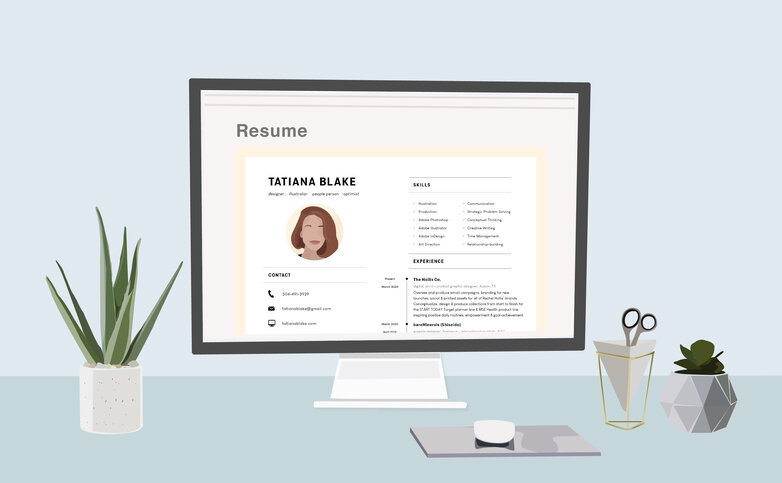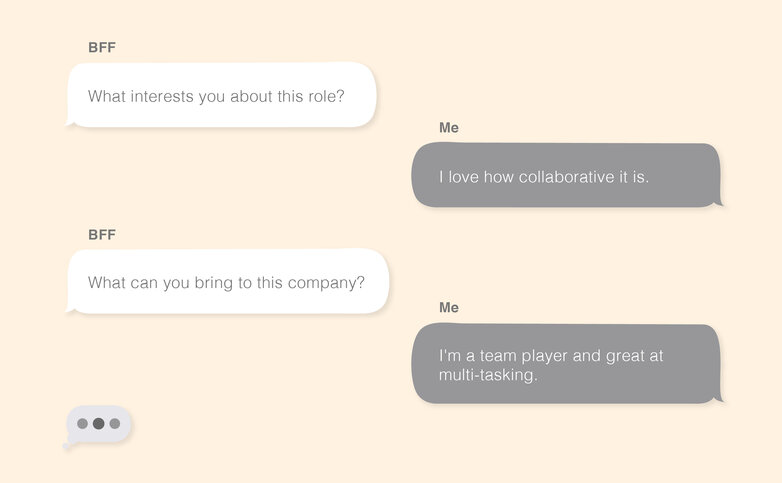6 Proven Ways to Land Your Next Job, According to Pros

Oh, job hunting. Few people love the process, but good news is that after a historically difficult market this spring, companies are absolutely hiring right now.
“Yes, there are companies that aren’t doing well, but there are companies that are prospering and growing in the new market, and are looking for qualified candidates,” says Melanie Feldman, a career coach and the co-founder of Going Places, a career-development platform. “The difference is that there are way more qualified candidates, and there is a much larger pool of candidates because of the virtual nature of most jobs today.”
So with help from Feldman and other career experts, we’re filling you in on a few key job interview tips to help you get a leg up.
Fresh Ideas are Good Ideas
While a complete 180-degree pivot isn’t necessary or even recommended, it’s wise to think bigger and broader regarding the type of job you want or are willing to take right now — you may be surprised by how much you enjoy a slight pivot from your current or previous role.
“Don’t box yourself into one job description or skill set,” advises Blair Heitmann, a career expert for LinkedIn, the employment-oriented social platform. “Think about how to expand the roles, companies, and industries you’re willing to include in your job search — even if they don’t entirely align with your past experience, career goals or college major. Getting your foot in the door and gaining experience can be a bridge to a more fitting job in the future.”
Along the way, try not to feel discouraged if you don’t possess prior experience within the industries that are hiring. Think creatively about where your skills could be applied to positions within those industries. The bottom line is that regardless of your background or industry, right now is a great time to build transferable skills that can be applied to a wide range of jobs.
Make Good Connections
If you can, Feldman recommends getting an internal referral for any position you’re interested in. This gives you an automatic one-up since you come recommended, and it puts you in a more personal category when competing against other applicants. If you’ve tried doing that and/or it simply isn’t possible, then your next step is to authentically connect with the hirers. That means being as genuine as you can in the application, communication and interview processes.
“Humans are pretty good at spotting when someone is pretending, ‘faking it’ or putting on. For example, if you’re feeling nervous then feel free to say that in an authentic, but non-crippling way. If you’re excited then say that, too,” says Hilary Billings, founder of Red Carpet Confidence and a career keynote speaker. “Your interviewer will appreciate your willingness to be a human in a traditionally ‘manicured’ environment.”
There are other ways to network, as well. We tend to think of traditional networking as grabbing coffee or lunch, but you can absolutely network virtually. Heitmann says: take some time to send messages to your contacts you haven’t spoken to in a while, and do not be afraid to ask for help!
“You never know who might be able to make introductions to helpful connections for a job, now or down the road. However, don’t only reach out with an ask. Maintain your relationships by checking in every six weeks or so, recognize milestones, and engage with others’ posts to stay engaged,” notes Heitmann.
Good Impressions
It’s the 21st century, friend — everyone is online. Clean up your social media feeds with a professional profile picture and update your website so it’s accurate. If you don’t have a website, consider creating a simple, one-page site that outlines your skills. Numerous platforms make this easy, including Squarespace, Wix, and ShowIt.
“Recruiters and hiring managers do look at your [online presence] when considering you for a job, so make sure that your social media accounts and LinkedIn profile are updated and professional. Include a clear headshot, your location, a brief summary and descriptions of what you did at your previous jobs, as well as concrete ways you contributed.”
Good Prep = Great Interview
When you land an interview, take as much time as possible to prepare. That means really familiarizing yourself with the company, including their philosophy, mission and employees. It also means preparing to answer all those expected questions.
“Don’t underestimate the importance of the ‘tell me about yourself’ ice-breaker. It’s always the first thing the interviewer will say to you, so get off on the right foot. It’s also your chance to control your own narrative,” says Feldman.
It might seem like a no-brainer when it comes to interview preparation tips, but it’s not always easy enough to talk about yourself. Come up with a ~1-minute blurb that includes your past experience, then practice saying your answer out loud. Feldman also says to prepare at least two questions for each person interviewing you. These can be specific to high-level, big-picture plans for the company, questions about your potential future role, or questions about their latest blog post/article/product release.
Finally, treat the job description as your blueprint. Every question you answer should direct right back to the description, which the company likely spent a lot of energy and time putting together. While preparing, understand how your experience relates to the job description and how to eloquently tell your stories to communicate your strengths.
Bring Good Energy
This advice applies particularly to situations where you might have had a bad experience at a previous place of employment. It’s absolutely OK to discuss that — and chances are you’ll be asked about your past employer — but avoid doing so from an emotionally charged place.
“Try to put the feelings in neutral by just stating the facts. For example, ‘Oh, I left my previous job because I no longer felt like I was growing and knew it was time for change,’ or, ‘I actually felt a disconnect with our leadership and knew I needed a more collaborative environment,’” says Billings. “There is 100% a way to communicate the situation honestly without attaching emotional exaggeration. This also denotes integrity and a level of emotional maturity to your decision maker.”
Look Good so You Feel Good — Virtual or Otherwise
You’ve probably heard it a million times, but your image really does speak loudly; it provides clues for others about who you are.
“When you’ve done your research on the role you are applying for, you will also be able to reflect what’s important to the interviewer. Think of your outfit in terms of visual data, but keep in mind that your clothing shouldn’t steal the show or, distract from your message,” says Leena Alsulaiman, a personal stylist and brand strategist.
Alsulaiman is also full of tips for video interviews. In this scenario, you’ll need to consider not just your outfit, but also your environment. A clean and professional background is ideal, but more importantly, the light should be excellent, your phone or computer should be propped up at eye level, and the space should be relatively free of visual and noise distractions.
“Have a light facing you, even if it’s from a window, and never coming from behind you. You can’t go wrong with soft and natural lighting. If you don’t have great lighting invest in a small ring light — it’s worth every penny,” says Alsulaiman. “Also make sure to test your video and audio beforehand to tackle and resolve any tech issues you may encounter.”
It’s a lot to take in, we know. But you’ve got this! Be flexible and open to new opportunities, network like you mean it, prepare as much as possible, and be your authentic self.
Illustrations by Kayla Moffatt









